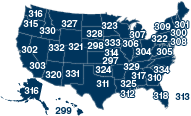2011 No. 6 - October 27, 2011
POSTAL SERVICE SUGGESTS SWEEPING OPERATIONAL CHANGES ARE NECESSARY
In addition to the recent Finance Presentation discussed in last week’s update, the Postal Service has provided the NPMHU bargaining team with an Operations Presentation. During this meeting, the Postal Service highlighted key changes that the agency wants to make to the current operating model in order to reduce costs.
Underlying the presentation was the notion that in the past, the Postal Service’s question was typically: “How can we expand operations to stay ahead of the growth in mail volume?” Now, however, the principal question for the Postal Service has transformed into: “How can we shrink our expenses to keep costs in line with declining revenue?” According to the Postal Service, this paradigm shift will mean significant changes in the way that the Postal Service runs its operations around the country.
The Postal Service is convinced that the most appropriate course of action is to “shed excess capacity.” This means a combination of reduced work hours, reduced service hours and, as USPS Vice President of Network Operations Dave Williams emphasized, a “reduction in our operational footprint.”
To make these adjustments, the Postal Service is currently conducting more than 250 Area Mail Processing feasibility studies in which it plans to assess various options for consolidating – and possibly closing – many mail processing facilities across the country. The Service believes that such efforts will result in a “dramatic contraction” of its current operations.
In addition to consolidating and/or closing facilities, the Postal Service has proposed to change its Service Standards to allow more flexibility in its operations. The Postal Service believes that its existing Service Standards dictate service requirements that are rigid and that control the entire operating model followed by the Postal Service. Instead, the agency is looking to design a lower-cost operating model, which will be formulated through the aforementioned facility consolidations and closures, and will require an adjustment in the Service Standards to comply with this revised model.
In short, the USPS goal is to create a 20- hour daily operating window, with all of the processing work being accomplished during these hours, leaving only 4 hours of downtime for maintenance of the machinery and similar functions. In order to implement this plan after the facilities have been consolidated, the Service Standards for most First-Class Mail and Periodicals would need to be adjusted from overnight or one-day delivery to two-day delivery.
Employee flexibility also was mentioned repeatedly as a key concern for the Postal Service. The USPS believes that under the new model it will be able to determine by 8:00 a.m. each morning exactly how many work hours will be necessary to complete the day’s processing of mail, which would now begin at noon each day. Given that the Postal Service believes it will be able to make this determination before the work begins, it seeks the ability to make adjustments in working hours as needed to maximize its ability to respond to daily volume changes.
Another way that the Postal Service will attempt to cut costs is by scrapping any plans in the near future for technological innovation. Instead, management will be seeking to maintain, sustain, and prolong the life of current equipment and technology. The current financial squeeze means that the little money the Postal Service has available must be used for other more exigent purposes.
The NPMHU is skeptical that the proposed model will help the Postal Service achieve financial solvency. In addition, the NPMHU is of the opinion that such a vast realignment of postal facilities and operations under such a plan would be likely to cause unwarranted hardships for many members in the mail handler craft. Thus, the NPMHU will continue to advocate for alternative solutions to the Postal Services financial distress, and it will continue to oppose proposals that fail to uphold the interests of all mail handlers. This process will continue to play out over the coming weeks during main table bargaining sessions, as well as during informal subcommittee discussions.
Please watch for the next Contract Update, which will discuss the current status of formal negotiations and subcommittee talks.
